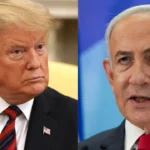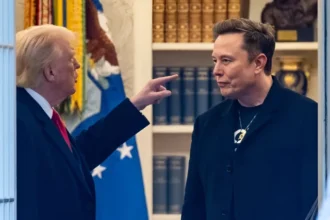The United States is preparing for a partial evacuation of its embassy in Iraq and allowing military dependents to voluntarily leave key Middle Eastern countries like Bahrain and Kuwait, amid rising regional security threats, U.S. and Iraqi sources confirmed on Wednesday.
Although the exact nature of the threats remains unclear, the decision signals Washington’s growing concerns over the possibility of military escalation involving Iran. Oil prices surged by more than 4% after the reports emerged, with Brent crude reaching $69.18 per barrel.
A White House official confirmed that former President Donald Trump has been briefed on the situation. The State Department clarified that the decision followed a regular review of American personnel safety overseas.
While the U.S. embassy in Kuwait emphasized it remains fully operational, other U.S. embassies in the region have begun scaling back non-essential staff. Defense Secretary Pete Hegseth has also authorized military families to leave voluntarily from bases in the region, particularly from Bahrain, which hosts a significant number of dependents.
The move follows Iranian Defence Minister Aziz Nasirzadeh’s stark warning that any strikes on Iran would be met with direct retaliation against U.S. bases across the region.
The Middle East, already strained by the 18-month Gaza war, is now facing additional tension as the next round of U.S.-Iran nuclear talks looms. Trump has voiced doubt over Tehran’s sincerity, saying he is “less confident” that Iran will agree to cease uranium enrichment — a key U.S. demand.
The U.S. has increased military deployments over the past few months, including bombers and aircraft carriers, though many have now rotated out. Meanwhile, British maritime authorities have warned of potential disruptions in the Gulf, Gulf of Oman, and Strait of Hormuz, urging caution for vessels in the critical oil shipping routes.
Inside Iraq, which maintains ties with both the U.S. and Iran, pro-Iran armed factions have frequently targeted U.S. troops since the Gaza conflict began in October 2023, though such attacks have declined recently.
In a separate development, U.S. General Erik Kurilla, head of CENTCOM, delayed his testimony before Congress due to the heightened regional tensions. He previously mentioned providing “a wide range of options” to prevent Iran from obtaining nuclear weapons.
Iran’s U.N. mission posted on X (formerly Twitter):
“Threats of ‘overwhelming force’ won’t change facts: Iran is not seeking a nuclear weapon and U.S. militarism only fuels instability.”
As diplomatic efforts continue and Iran is expected to present a new proposal, the region holds its breath, fearing the next spark could light a much wider fire.














